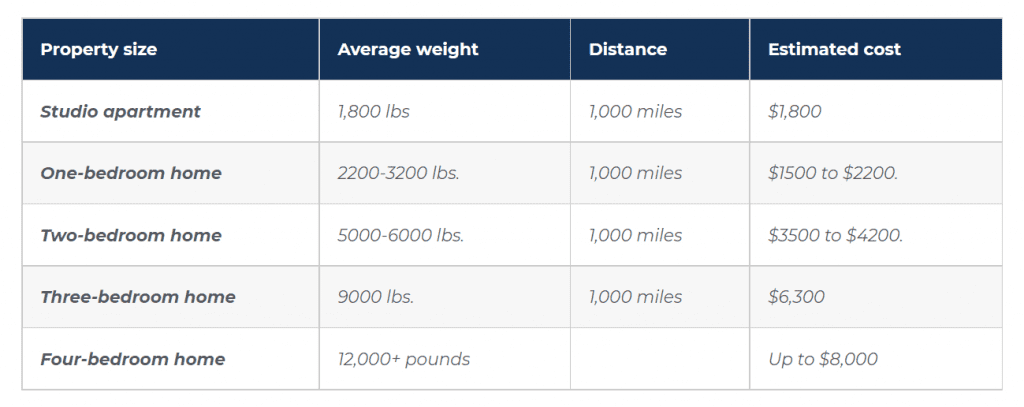SUMMARY: The average cost of a long distance move is $6,500. You get what you pay for when it comes to long-distance movers. The two biggest cost factors when moving long-distance are weight and distance. Read about how much you can expect your long-distance move to cost.
Hiring long-distance moving companies can cost around $2,000 to $8,000, based on the distance you are moving and the level of task you are willing to personally take care of. The quantity of household items you are moving also determines the overall cost.
Movers are hired by people to save time and stress and to make sure that their relocation is professionally managed. To make a genuine moving budget with as little surprise as possible, it is important to find out the costs that come with a long-distance move.
Knowing that a lot of tasks are involved when moving long distances, many of which can be stressing a lot; hiring a professional mover is often the ideal option.
What is the per hour cost to hire movers? How are they paid? What type of costs can come up as a surprise to you? Relax. We will talk about all you need to know about long-distance movers’ charges.
What is the Average Cost of Long-Distance Moving?
As a general rule for the cost of moving long distances is around $.50 and $.70 per pound of items moved 1,000 miles from the actual location. For instance, the items in a 1-bedroom weigh roughly 2,000 pounds, which amounts to about $1,000 – $1,400 when moved.
When you are planning a budget for a long-distance move, you will not be paying an hourly rate with most movers. Rather, you will be paying a flat fee depending on where you are starting from, your destination, and the overall weight or volume of furniture and other belongings that you are relocating.
Based on the size of your items, you can get ready to pay around $2,000 and $8,000 for professional moving companies to transport you over 100 miles from your current location.
In comparison, the weight of items in a standard 3-bedroom home is roughly 9,000 pounds, which equals an estimated $4,500 to more than $6,000 for moving. Costs can then vary based on the distance of the move is lower or beyond 1,000 miles.
Long-distance move costs can be gotten depending on your home’s size:

| Property size | Average weight | Distance | Estimated cost |
|---|---|---|---|
| Studio apartment | 1,800 lbs | 1,000 miles | $1,800 |
| One-bedroom home | 2200-3200 lbs. | 1,000 miles | $1500 to $2200. |
| Two-bedroom home | 5000-6000 lbs. | 1,000 miles | $3500 to $4200. |
| Three-bedroom home | 9000 lbs. | 1,000 miles | $6,300 |
| Four-bedroom home | 12,000+ pounds | 1,000 miles | Up to $8,000 |
A sample quote for location distance

| From | To | Miles | Average cost |
|---|---|---|---|
| Los Angeles | Phoenix | 365 | $3,753 |
| Springfield, IL | Denver | 811 | $4,760 |
| Trenton, NJ | Houston | 1,367 | $5,930 |
| Sacramento, CA | Raleigh, NC | 2,343 | $7,713 |
Extra Costs for a Long-Distance Move
Moving companies often charge for extra services that they could render with your long-distance move. The costliest additional cost is the exact packing and unpacking of your shipments. Also, you should contact 3 – 4 movers to give you an on-site estimate of packing cost depending on the quantity and types of items in your home. Below are other special costs:
- Handling bulky, heavy, or delicate goods like swing sets, antique, and pianos
- Carrying shipments beyond 75 feet to and from the moving truck
- Disassembling furniture and disconnecting appliances
- Storing goods before the move
- Using an elevator and stairs
How much is the Cost of Additional Moving Services?
There will be additional costs for local and long-distance moves if you pick additional services:
- Cost of packing service: If you ask your movers to pack and unpack your household shipments, expect to spend an extra cost of $300 to $500. You will pay hourly for the labor, and there may be extra costs to pay for supplies. The extra cost could be a worthy deal for the number of times and the level of stress you can save by not lifting a finger.
- Cost of storage unit: If you need to keep some goods in a storage unit or a portable storage container, remember to include that cost inside your overall moving budget. Storage services can be a friendly option when required, but you can plan to pay around $50 close to a few hundred dollars every month your goods are in storage, based on the size of the storage container or unit you need.
- Cost of moving insurance: With moving insurance, you are financially protected if your goods are damaged or lost when moving. The median cost for full-value coverage moving insurance is around 1% and 5% of the value of the items covered. If you plan to insure $10,000 worth of goods, you can plan on paying around $100 and $500 for moving insurance.
What Factors Dictate Your Overall Moving Cost?
There are a few important factors that dictate your overall moving costs.
- The home’s size: Moving a 4-bedroom home is going to be expensive than moving a 1-bedroom apartment. When you get quoted by removal companies, they will ask for the number of bedrooms you are moving as well as the size of your house (in square footage) to provide you with an estimated cost of your move, but there may be a need for them to take a walk through your home to issue the most accurate quote to you.
- Location: If you live inside an apartment building with multiple stairs or where close parking is not possible, you may be charged an additional fee. Even residing on a higher floor can also increase your cost. Your community can also dictate your moving price. Not every city street is friendly or sufficiently wide for parking a large relocation vehicle. Some moving companies will add a surcharge if they are to walk beyond 75 feet from the truck to the home.
- Distance and travel fees: To move long distances, the difference of distance between where you currently live and the destination home is one of the major factors for costs.
- Extra stops: Making several stops will also cost more, so prepare to pay a lot more if you plan to load and unload belongings in several locations, such as your house and a storage facility.
- Special items: Moving companies charge more to haul large, bulky, or heavy goods like grandfather clocks, pianos, fragile antiques, and art. You will also be required to consider the cost of additional insurance for items of extraordinary value. Be ready for some goods that moving companies won’t transport, such as pool chemicals, car batteries, and perishable goods.
They also recommend that customers move valuable personal belongings, such as family photos and heirloom jewelry themselves. It is difficult to place a price tag on those belongings, so try making personal arrangements to move them.
FAQ about Long-Distance Moving Cost
How do interstate movers get paid?
While short-distance (local) movers get paid by the hour, interstate (long distance) moving companies tend to be paid by the load – $2,000 to $5,000 per shipment, to be precise, and $0.5 per pound. This implies that the quantity of your belongings doesn’t matter, but the weight does.
What is the cost to move 500 miles?
The cost of relocating from a one-bedroom apartment to another one located 500 miles away is close to $1,500 while relocating to a new location 1000 miles away should cost you around $2,000.
What is the ideal amount for tip movers?
Generally, you should tip $4 to $5 to your movers for every hour they worked for you. So if your move takes 4 hours and you were satisfied with the service, the appropriate amount considered as a tip for each mover is $16 to $20.
A Successful Long-Distance Move is the Best
The cost of hiring a moving company follows the adage that says you get your money’s worth as regards your long-distance move. Working with professional, reliable movers saves time, reduces stress, saves you from potential bodily injury, and greatly makes sure of the safety of your shipments.



